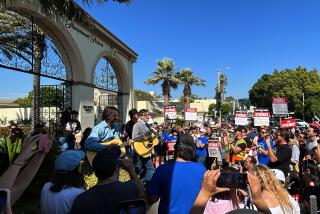Beating the drum for radio royalties
- Share via
WASHINGTON -- — She did it her way, with boots that were made for walking, when Nancy Sinatra followed in her famous father’s footsteps by becoming a singer. Now, just as the late Frank Sinatra did, she’s striding down another similar path -- activism for fellow musicians.
On Wednesday, she headlined a House subcommittee hearing, urging lawmakers to force broadcast radio stations to pay royalties to performers and record companies when the stations air their songs. Although composers and songwriters get royalties from radio stations, singers and musicians who perform those songs, along with the labels that own the recordings, get nothing.
“It’s not about me. It’s not about my dad. Certainly, Dad wasn’t fighting for this because he needed more money,” Sinatra, 68, testified. “We are in search of fairness.”
The issue has become crucial to musicians and recording labels as CD sales continue to fall in the digital age. The industry launched a major push last year to try again to persuade Congress to institute a performance royalty. It could amount to hundreds of millions of dollars a year for musicians and record labels, which would split the fees.
Frank Sinatra organized musicians to lobby for a radio performance royalty in the late 1980s, but they were unsuccessful. Nancy Sinatra and her allies again face tough opposition.
Although musicians and record companies have a strong supporter in Rep. Howard L. Berman (D-Valley Village), who chairs the House subcommittee that handles intellectual property issues and who introduced a bill to repeal the radio exemption, the legislation’s fate is unclear.
Traditional broadcast radio stations, struggling themselves against satellite radio and iPods, have launched an intense counteroffensive. The National Assn. of Broadcasters has lined up a majority of House members behind a separate bill declaring a performance royalty would hurt local radio stations. The group released a report this week saying that the free promotion from radio airplay generates $1.5 billion to $2.4 billion in music sales each year.
“Radio airplay drives record sales,” Steve Newberry, chief executive of Commonwealth Broadcasting Corp., which operates 23 radio stations in Kentucky, told Berman’s subcommittee. “The system in place today has produced the best broadcasting, music and sound recording industries in the world. It is not broken and is not in need of fixing.”
But musicians and some lawmakers say the system has been broken for years. Some noted that Bo Diddley, the rock legend who died this month, had to keep touring into his 70s because he received no money from the airplay his recordings got on the radio.
“The bill is designed to fix a glaring inequity,” Berman said. His legislation would remove the exemption for over-the-air radio stations and have a panel of copyright judges set the rates, probably a small percentage of revenue. Stations, with gross revenues less than $1.25 million a year, would play a flat $5,000 annual fee.
Musicians and record companies feel they have fairness on their side because performance royalties now are paid by satellite, cable music channels and Internet radio.
Berman hopes to push the bill through his subcommittee in the coming weeks, although support is mixed.
“The benefits of having songs played on free radio by the local radio stations are tremendous,” said Rep. Ric Keller (R-Fla.) “When the songs are played, record sales go up.”
Berman’s bill has some key backers, including House Judiciary Committee Chairman John Conyers Jr. (D-Mich.). Supporters of the bill, which include the Recording Industry Assn. of America, also have Senate Judiciary Committee Chairman Patrick J. Leahy (D-Vt.) on their side. And the Bush administration signaled its support this week.
Mitch Bainwol, who heads the RIAA, said he was hopeful Congress would approve the bill this year. But supporters say they will push again next year if they fail.
--
More to Read
The biggest entertainment stories
Get our big stories about Hollywood, film, television, music, arts, culture and more right in your inbox as soon as they publish.
You may occasionally receive promotional content from the Los Angeles Times.











